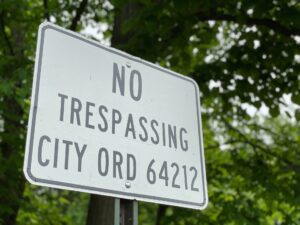What Happens if a Trespasser Gets Hurt on Your Property
As the owner, you are responsible for ensuring the safety of everybody who enters your property. Accidents can still occur even if you take every precaution, and the injured party could be an unauthorized intruder. What happens if a trespasser gets hurt on your property and what measures you might take to protect yourself and your possessions are discussed in this article.
What is a Trespasser?
A trespasser is someone who enters your property without your authorization. Nobody, not even people or animals, is allowed on your land. If you trespass on someone else’s property without permission, the owner may take legal action against you.
However, the meaning of trespasser in the law differs from state to state, and trespassers may be allowed on your property in some circumstances. For example, if a neighbor has an easement to access their property from yours or if a public right-of-way crosses your land. In such cases, be sure to get the help you need. Don’t try to work out these cases without legal help.
What are the Risks of Trespassing?
The trespasser and the property owner are in danger when a trespass occurs. Those who trespass on private property face danger by encountering dangerous situations, such as hazardous animals, slippery floors, or perilous vegetation. Significant health risks arise if people expose themselves to harmful substances like chemicals or asbestos.
Property owners may face legal trouble if trespassers cause any damage. Someone who trespasses on your property and gets hurt could file a lawsuit seeking damages from you. Suppose they can prove that you were negligent in maintaining your property. In that case, you could be held accountable for any damages they sustain while on it, even though you were unaware of their existence.

What are the Legal Obligations of Property Owners?
It is the responsibility of every property owner to ensure the safety of their guests. That includes fixing apparent hazards, including broken sidewalks and loose railings, and implementing other preventative measures.
However, the extent of a property owner’s liability may vary, depending on the case’s specifics. To illustrate, if you know that children frequently play in your yard, you may have a higher duty of care to keep it safe for them. Experts at peasleyboisemovers.com advise you to protect yourself from these situations, especially after you move to a new home.
Trespassers are not guaranteed any form of protection from property owners. Nonetheless, they are forbidden from setting traps or otherwise making the area hazardous on purpose to hurt trespassers.
What Happens if a trespasser gets hurt on your property?
A visitor to your home who becomes injured could hold you responsible for their injuries. However, the specific legal implications will depend on the specifics of the incident.
If a trespasser got injured on your land and you knew about the dangerous condition or should have known about it, you could be liable for their injuries. Someone could hold you legally responsible for a trespasser’s injuries if, for instance, you knew that a stairwell was in disrepair but did nothing to fix it.
But, you may not be held liable if the trespasser was hurt due to their reckless behavior, such as climbing a tree or leaping over a fence. Nonetheless, due to the complexity of the issue, you may need a defense attorney.

Steps to Protect Yourself and Your Property
There are a few things you can do to shield yourself and your property from liability if a trespasser gets hurt on your property:
- Keep an eye out for potential hazards on your property and take care of them as soon as possible. That will help reduce the likelihood of harm occurring in the first place. Make sure to follow all the essential fire safety protocols.
- Put up signs: Ensure trespassing is prohibited by putting notices around your property. If harm occurs on your property, this could help prove that you took reasonable measures to deter trespassers.
- You should secure your land by erecting barriers like fences, gates, and anything else that would make it difficult for unauthorized people to enter. Although showing that you avoided trespassing, this measure could also help reduce the likelihood of accidents and injuries.
- Contact a lawyer: Get legal counsel if you have concerns about your potential liability as a property owner. A lawyer can help you understand your rights and duties under the law and give you advice on how to safeguard your possessions.
- Consider getting liability insurance to safeguard yourself financially in the event of a lawsuit. Liability insurance can help cover the cost of a lawsuit and medical bills if an unauthorized person gets injured on your property.

Conclusion
Property owners must be aware of their responsibilities and probable liability in case of trespasser injury to protect their assets. You are not obligated to protect trespassers, but you should still take precautions to avoid accidental or malicious harm to your property.
Take all necessary safety measures to safeguard yourself and your property from harm, which includes putting up warning signs and consulting an attorney if you are worried about liability. In a legal dispute, it is also prudent to invest in liability insurance. Take preventative measures to ensure the security of your property and decrease the likelihood of accidents and injuries. It will also shield you from legal liability. If a trespasser gets hurt on your property, you will be as legally protected as possible.
